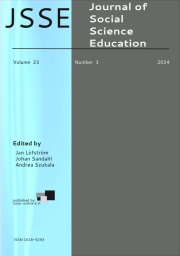Controversial issues in Norwegian social science classrooms
DOI:
https://doi.org/10.11576/jsse-7075Keywords:
political efficacy, controversial issues, democratic participation, social science didactics, civic educationAbstract
Highlights
– Research discusses how civic education may alleviate social inequality in political efficacy.
– Openness towards and awareness of controversial issues may play an important role.
– Teachers show significant differences when interpreting what makes an issue controversial.
– The political and epistemic interpretation seems more influential than the emotional criteria.
Purpose: The aim of the article is to contribute to an overall discussion of how civic education may influence the political efficacy of adolescents, with specific emphasis on social equalisation. We analyse how the inclusion of controversial issues in civic education may contribute towards increased social equalisation in political efficacy.
Design/methodology/approach: Our study follows a qualitative research design and is based on semi-structured interviews with social science teachers in Norwegian lower-secondary schools. Our contribution is influenced by extensive quantitative research, on which we seek to expand through qualitative exploration.
Findings: Our main finding is that the inclusion of controversial issues in civic education does not in itself contribute towards social equalisation in political efficacy, but that more openness towards and different understandings of controversial issues that are included may potentially do so.
Research limitations/implications: The scope of our study is limited by its size, but it should give some direction for further research.
Practical implications: We suggest that teachers may benefit from approaching controversial issues in a less personal way, favouring epistemic and political criteria rather than emotional ones.
Downloads
Published
How to Cite
Issue
Section
License
Copyright (c) 2024 JSSE - Journal of Social Science Education

This work is licensed under a Creative Commons Attribution-ShareAlike 4.0 International License.



